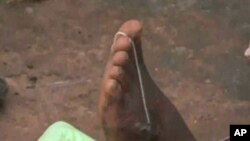In the last 12 months, no case of Guinea worm disease has been found in Nigeria. It's a major step in former President Jimmy Carter's effort to eradicate the parasitic disease worldwide. The Carter Center has been leading the battle against Guinea worm - in partnership with the U.S. Centers for Disease Control and the World Health Organization.
Guinea worm is a painful disease spread through contaminated water. Most in the developed world have never seen or experienced it.
Health Expert Kelly Callahan, of the Carter Center, says her first encounter with a Guinea worm patient still haunts her. "The woman actually had three worms emerging at one time, one on each of her feet," she described. "So with three different worms coming out, she couldn't get up to walk to take care of her three year old child, much less breast feed her infant at the time.
After entering the body, Guinea worm forms near the intestines and eventually burrows into connective tissue or near to joints. While often not deadly, the worm, after about a year, emerges from the body, usually in the lower limbs, causing intense pain.
Nigeria had more than 650,000 cases when former President Jimmy Carter targeted Guinea worm in 1986. "It only exists in the most isolated and poverty stricken villages in the world. We found Guinea worm in 20 different countries. 23,600 villages. We've been in all of those villages," he said.
Today, Nigeria is on a path to being recognized by the World Health Organization as free of Guinea worm disease, thanks to efforts by the Carter Center to teach people how to filter water in their villages, among other preventive measures.
It's no small feat according to Carter Center Health Program Director Dr. Donald Hopkins. "We have no vaccine, no way of curing this infection, and it's a year long incubation period, so it's taken longer than we expected," Dr. Hopkins said. "But we never doubted the fact that with existing knowledge and tools we would be able to help countries eventually eradicate Guinea worm disease."
"Now we are down to one 10th of one percent of the cases left, mostly in Southern Sudan where conflict prevents our getting completely into some of the villages," Mr. Carter stated.
Eradicating the disease in Sudan is linked to stability. Increased violence and voter intimidation before upcoming elections threaten to shatter a peace agreement between the government in Khartoum and Southern Sudan.
"In order to complete this disease eradication, we need to have some permanent peace between north and south Sudan, where two million people have been killed from the war," Mr. Carter said.
The Carter Center is in Ghana, Ethiopia, Mali and Sudan, the last countries plagued by the disease. The goal is to wipe out Guinea worm once and for all.
"There's only been one disease in the history of humankind ever eradicated, and that was smallpox more than 30 years ago," Mr. Carter stated. "Guinea worm is soon going to be only the second disease in history to be wiped off the face of the earth."
President Carter says he is confident Guinea worm will be eradicated in his lifetime.
News
Carter Center Nears Goal Against Guinea Worm
update




